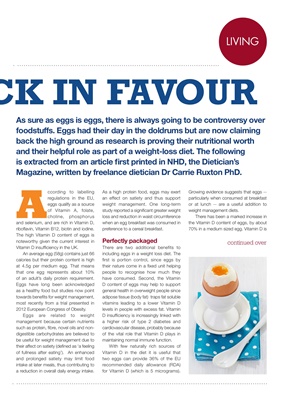
CK IN FAVOUR
According to labelling
regulations in the EU,
eggs qualify as a source
of Vitamin A, folate,
choline, phosphorus
and selenium, and are rich in Vitamin D,
riboflavin, Vitamin B12, biotin and iodine.
The high Vitamin D content of eggs is
noteworthy given the current interest in
Vitamin D insufficiency in the UK.
An average egg (58g) contains just 66
calories but their protein content is high
at 4.5g per medium egg. That means
that one egg represents about 10%
of an adult's daily protein requirement.
Eggs have long been acknowledged as
a healthy, food but studies now point
towards benefits for weight management,
most recently from a trial presented in
2012 European Congress of Obesity.
Eggs are related to weight
management because certain nutrients
such as protein, fibre, novel oils and nondigestible carbohydrates are
believed to
useful for weight management due to their
affect on satiety (defined as 'a feeling of
fullness after eating'). An enhanced and
prolonged satiety may limit food intake
at later meals, thus contributing to a
reduction in overall daily energy intake.
continued over
As sure as eggs is eggs, there is always going to be controversy over
foodstuffs. Eggs had their day in the doldrums but are now claiming
back the high ground as research is proving their nutritional worth
and their role as part of a weight-loss diet. The following is extracted
from an article first printed in NHD, the Dietician's Magazine, written
by freelance dietician Dr Carrie Ruxton PhD.
As a high protein food, eggs may exert
an effect on satiety and thus support
weight management. One long-term
study reported a significant greater weight
loss and reduction in waist circumference
when an egg breakfast was consumed in
preference to a cereal breakfast.
Perfectly packaged
There are two additional benefits to
including eggs in a weight loss diet. The
first is portion control, since eggs by
their nature come in a fixed unit helping
people to recognise how much they
have consumed. Second, the Vitamin
D content of eggs may help to support
general health in overweight people since
adipose tissue traps fat soluble vitamins
leading to a lower Vitamin D levels in
the obese. Vitamin D insufficiency is
increasingly linked with a higher risk
of type 2 diabetes and cardiovascular
disease, probably because of the vital role
that Vitamin D plays in maintaining normal
immune function.
With few naturally rich sources of
Vitamin D in the diet it is useful that
two eggs can provide 36% of the EU
recommended daily allowance (RDA)
for Vitamin D (which is 5 micrograms).
Growing evidence suggests that eggs --
particularly when consumed at breakfast
or at lunch -- are a useful addition to
weight management diets.
There has been a marked increase in
the Vitamin D content of eggs, by about
70% in a medium sized egg. Vitamin
LIVING